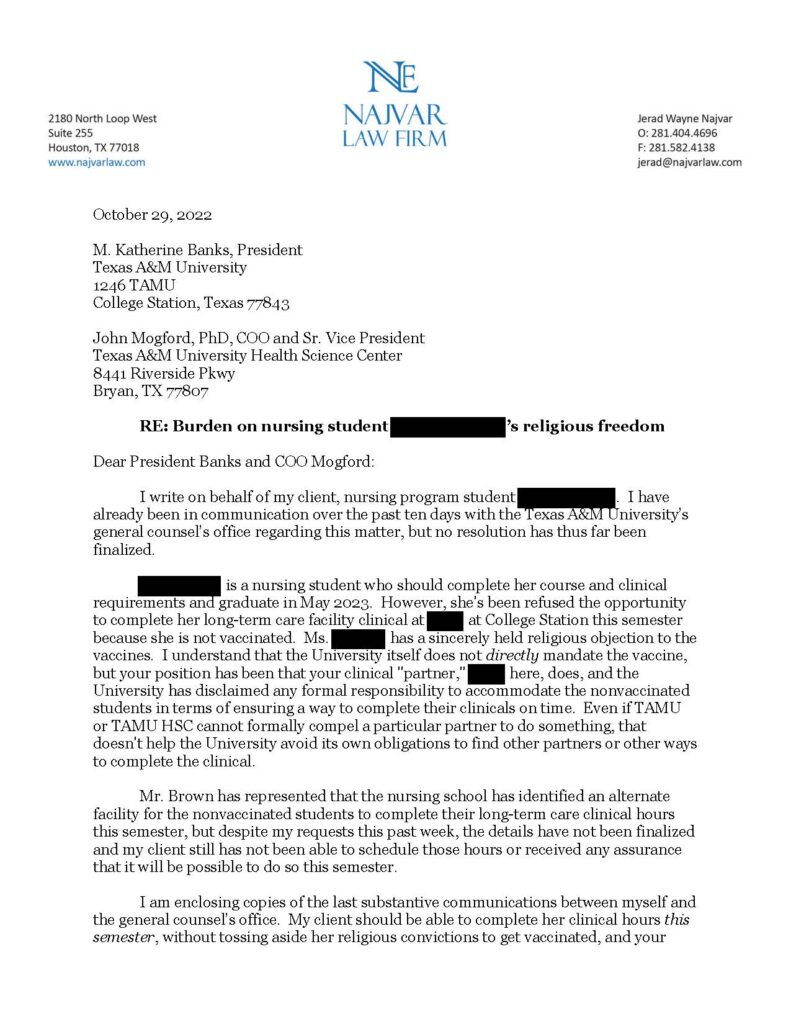
I haven’t used this blog much recently as I’ve been planning a relaunch after changing firms (having proudly joined Chalmers, Adams, Backer & Kaufmann LLC in 2024), and lacking time to blog given recent litigation demands. But events have forced my hand; this space will be re-launched and populated with much more content very soon, but I had to get some information out that I hope will help students currently facing vaccine mandates. EXAMPLE TEXAS RFRA DEMAND CORRESPONDENCE (discussed in this post), HERE. (Note that my email address has changed given the move to Chalmers Adams since this letter was written. You can find my short bio and contact here.)
I’ve seen multiple social media posts over the last few days reporting that students at various Texas institutions are still being coerced into taking certain shots. This is likely illegal and they have rights to assert that should allow them to avoid the mandates. Really, it is disgusting that these institutions still cajole students into certain medical interventions at all, and even more so without respecting or advising them of their rights to object. There is much more to say about this–about the probable illegality of these mandates as a general matter; about additional bases for challenging the Covid shot in particular; and other things. I’ll expand in additional posts later. But given the urgency of the matter for students in this situation now, I wanted to begin by pointing out a powerful statute that is still far too unknown and under-utilized: the Texas Religious Freedom Restoration Act (TRFRA).
I represented a nursing student at Texas A&M (my alma mater) who successfully stood on her right to a religious exemption to the Covid shot in 2022. The University, sadly, had been slow-walking a resolution, apparently hoping to coerce her to take the shot by the simple passage of time, threatening that she would not graduate on time unless she got the shot, because while the University wasn’t mandating it, its clinical partners all required students to have the shot to perform their clinical requirement. TAMU shamefully tried to hide behind its “partners,” claiming that it couldn’t force outside institutions (where the students performed their clinical rotations required for class credit) to accommodate student objections.
We pointed out that under TRFRA, the university had an obligation to make a reasonable accommodation for any student with a sincere religious objection; this meant that it had to take steps to find “partners” for clinicals that did not mandate the vaccine or that would accommodate the unvaccinated students.
The University’s general counsel’s office was dismissive of my client’s attempts to negotiate an accommodation for months. Soon after I threatened litigation under TRFRA, however, they caved, found a place for the client to complete her rotation, and she graduated on time. The TAMU general counsel initially doubted that we had a solid legal claim, and even sent a snarky email suggesting they really had no intention of taking us seriously. This is in the email chain attached to the demand letter linked here, along with my response. Within days, the issue was resolved.
Sadly, most of the students who had objected earlier on had already caved themselves and taken the shots; those students would have been accommodated also if they had forced the issue. Institutions like this don’t listen until they’re threatened with litigation or actually sued. And TRFRA provides a powerful tool to force common sense where it otherwise has not prevailed.
I’m sharing the redacted communications here with the litigation demand. TRFRA claims, like any litigation, are fact-specific and therefore this post cannot serve as legal advice for any other particular claim. But I suspect TRFRA itself will be sufficient to compel accommodations for many students (and others) who (quite reasonably) object to unwanted vaccinations.
